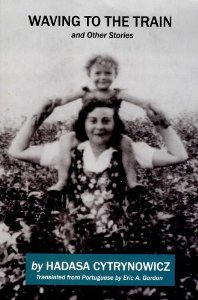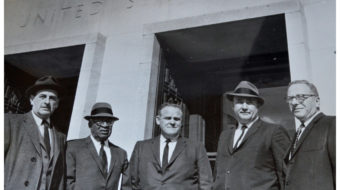
Waving to the Train and Other Stories, the recently published book by Hadasa Cytrynowicz (Blue Thread Communications), begins with a quote from the brilliant novelist Gabriel García Márquez: “Life is not what you’ve lived, but what you remember and how you remember it to tell it.” Ms. Cytrynowicz’s collection (translated to English from the original Portuguese by this reviewer’s occasional co-writer Eric A. Gordon), is an unfolding of short pieces reflecting the author’s life experiences beginning with her early childhood in Lodz, Poland.
The reader journeys with her across four continents, including a war-time sojourn in the Soviet Union, a failed return to her native Poland, a short stay in a camp in Stuttgart, emigration to Israel in 1949, then a half-century somehow still temporary “refuge” in Brazil, and finally to her present-day residence of Los Angeles, always searching for a place to call home. Waving to the Train is told in what her son Roney describes in the preface as “fictional memoir.” It is often a painful story to traverse.
Jewish families living in Poland in 1939 had the gravest of misfortunes foisted upon them as they were kicked to the curb by history. Those who survived, like Hadasa, born in 1935, after Hitler’s rise to power, were seared with deep psychological wounds- whose damage dominated the internal narratives of so many, and sadly would be carried through a lifetime.
In the piece “Footsteps,” we are witness to little Hadasa’s bone-chilling panic in her family’s house in Poland, where the “perfect black boots, shining Aryan boots” came to the door and demanded to know if her mother had any sons. In “You Can’t Talk, You Can’t Cry,” another tale oozing with childhood trauma, the tiny youngster is warned not to utter a sound when the family silently crosses the Bug River to the Polish city of Bialystok, occupied by the Soviets, in abject flight from the Nazis. This tale of the nightmarish silent escape is an emblematic foretelling of Hadasa’s lifelong anxiety-laden quest to find her authentic and integrated voice as she diligently copes with learning the new languages and absorbing the foreign cultures of her successive dwelling places.
Now fluent in Polish, Russian, Yiddish, Hebrew, and Portuguese, the author’s facility with language is a testament to her resiliency and drive, an unintended positive consequence of a turbulent early life.
Hadasa’s memoir belongs to what will surely be the last generation of eye-witness accounts of the World War II era. It invites readers to contemplate the thorny issue of Stalin’s place in history as the Soviet Union became a safe haven for Europeans of various stripes, including Hadasa’s immediate family, on the run from Hitler’s inhumanity. Hadasa was able to have some enjoyable times during her six Soviet years.
In “The Little Purse from Zakopane” we learn that she was able to dance, sing, and recite poetry while in kindergarten, and that she loved every minute of it!
Hadasa’s family returned to Lodz after the war but all was certainly not right. Believing she would be welcomed back to a place of familiarity, she was instead a stranger in the land of her birth, doomed to suffer the ravages of Polish post-war anti-Semitism: She recalls a scene of being shamed and insulted during a classroom blackboard exercise.
Extended family becomes a means of staying connected to the world as Hadasa and her story mature. She marries in 1954, and with her husband is soon bound for São Paulo, Brazil. The struggle to fit in, to be part of something larger than her immediate family, is repeated yet again in South America as Hadasa continues to learn important skills despite formidable cultural barriers. She teaches languages at the local university and raises a family.
Several stories reflect her gnawing awareness of severe class and ethnic disparities in her adopted land. “The Girl with the Single Little Braid” introduces us to a Japanese immigrant girl “who had saudade for something that not even she could name … who had no country, had no friends, had no paper to write on and send kisses, who didn’t understand the language of the people running in the street, but who had fear, a great fear … who had the lack of a smile.” Hadasa could relate!
Life continues in Los Angeles. Now, at age 78, one can only hope that one day soon Hadasa can feel truly, fully at home.
Photo: Amazon










